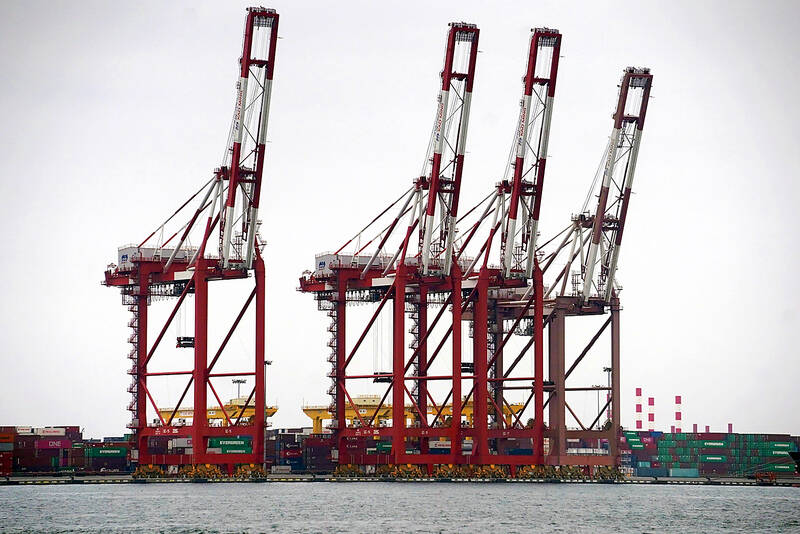Taiwan’s industrial production last month rose 19.97 percent from the same month last year due to strong demand for electronic components used in artificial intelligence (AI) and high-performance computing, the Ministry of Economic Affairs said yesterday.
The index printed 108.55 last month, up for the 10th straight month and an increase of 6.14 percent from a month earlier, the ministry said in a report.
The economic measure last year expanded 11.45 percent, emerging from two years of downturn in spite of an imbalanced recovery, it said.

Photo: CNA
The manufacturing industry outperformed other sectors, such as suppliers of electricity, water and chemical products, with an uptick of 20.79 percent, Department of Statistics Deputy Director-General Huang Wei-jie (黃偉傑) said.
The growth would continue this month at a moderate pace of 3.9 percent, Huang said, citing a survey of firms, as most of them would halt operations over the Lunar New Year holiday.
Last month, chip suppliers’ output swelled 37.51 percent from a year earlier, while output at vendors of computers, electronics and optical devices soared 58.78 percent, Huang said, attributing the gains to spending by US technology giants to build AI capabilities.
By contrast, base metal and vehicle parts suppliers reported a retreat of 4.24 percent and 9.05 percent respectively as the market needed more time to digest a supply glut, Huang said.
For the final quarter of last year, local chipmakers achieved a 26.77 percent increase in industrial output, as Taiwan is home to suppliers of advanced chips used in latest-generation smartphones and cloud-based data centers, as well as chip packaging.
Chip production last year spiked 25.12 percent compared with 2023, higher than the average 19.52 percent gain for electronic components, the ministry said.
Local manufacturers of chemical and metal products failed to stage a comeback for the third consecutive year, while auto parts makers slipped into contraction, ending three years of growth, Huang said.
“China’s overproduction accounted for the decline in global orders and selling prices,” he said.
The US-China trade dispute and geopolitical tensions are adding uncertainty, although AI development would continue, which is favorable to local tech firms, the ministry said.
Industrial output for this month would slow compared with last month, when customers built up inventory ahead of the Lunar New Year holiday, it said.
Only 6 percent of firms expected production to pick up, while 29.3 percent projected a decrease, it said, adding that 64.1 percent expected business to remain the same.

Nvidia Corp CEO Jensen Huang (黃仁勳) is expected to miss the inauguration of US president-elect Donald Trump on Monday, bucking a trend among high-profile US technology leaders. Huang is visiting East Asia this week, as he typically does around the time of the Lunar New Year, a person familiar with the situation said. He has never previously attended a US presidential inauguration, said the person, who asked not to be identified, because the plans have not been announced. That makes Nvidia an exception among the most valuable technology companies, most of which are sending cofounders or CEOs to the event. That includes

TARIFF TRADE-OFF: Machinery exports to China dropped after Beijing ended its tariff reductions in June, while potential new tariffs fueled ‘front-loaded’ orders to the US The nation’s machinery exports to the US amounted to US$7.19 billion last year, surpassing the US$6.86 billion to China to become the largest export destination for the local machinery industry, the Taiwan Association of Machinery Industry (TAMI, 台灣機械公會) said in a report on Jan. 10. It came as some manufacturers brought forward or “front-loaded” US-bound shipments as required by customers ahead of potential tariffs imposed by the new US administration, the association said. During his campaign, US president-elect Donald Trump threatened tariffs of as high as 60 percent on Chinese goods and 10 percent to 20 percent on imports from other countries.

Taiwanese manufacturers have a chance to play a key role in the humanoid robot supply chain, Tongtai Machine and Tool Co (東台精機) chairman Yen Jui-hsiung (嚴瑞雄) said yesterday. That is because Taiwanese companies are capable of making key parts needed for humanoid robots to move, such as harmonic drives and planetary gearboxes, Yen said. This ability to produce these key elements could help Taiwanese manufacturers “become part of the US supply chain,” he added. Yen made the remarks a day after Nvidia Corp cofounder and chief executive officer Jensen Huang (黃仁勳) said his company and Taiwan Semiconductor Manufacturing Co (TSMC, 台積電) are jointly

MARKET SHIFTS: Exports to the US soared more than 120 percent to almost one quarter, while ASEAN has steadily increased to 18.5 percent on rising tech sales The proportion of Taiwan’s exports directed to China, including Hong Kong, declined by more than 12 percentage points last year compared with its peak in 2020, the Ministry of Finance said on Thursday last week. The decrease reflects the ongoing restructuring of global supply chains, driven by escalating trade tensions between Beijing and Washington. Data compiled by the ministry showed China and Hong Kong accounted for 31.7 percent of Taiwan’s total outbound sales last year, a drop of 12.2 percentage points from a high of 43.9 percent in 2020. In addition to increasing trade conflicts between China and the US, the ministry said